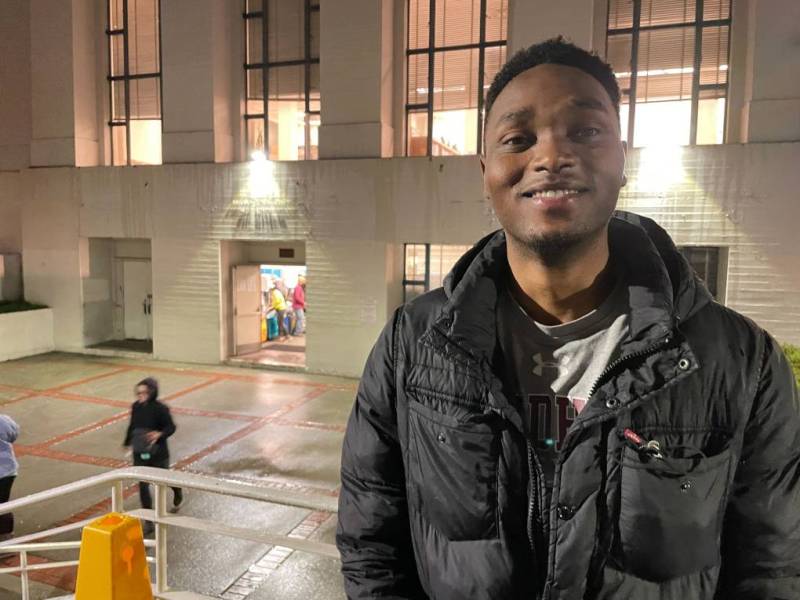Updated 6:30 p.m. Saturday
Pamela Price has won the closely watched and closely contested Alameda County district attorney’s race, with opponent Terry Wiley conceding the race late Saturday.
“I want to thank my family and everyone who supported me in my campaign, including my volunteers and everyone who voted for me,” Wiley said Saturday. “Although I expected a different result, I’m grateful for everyone’s support. I congratulate Pamela Price on becoming Alameda County’s first-ever African American District Attorney. I look forward to working with Pamela in her transition to District Attorney.”
Price, a progressive civil-rights attorney, had over 53% of the vote in the latest results Saturday, and Wiley — the county’s chief assistant district attorney under retiring DA Nancy O'Malley — had just under 47%, a difference of nearly 27,000 votes. Price had already declared herself the victor on Friday with a tweet that said “WE DID IT!”
The hotly contested race reflected two starkly different approaches to crime, which Alameda County voters consistently named a top priority — the increase in gun violence in Oakland, in particular — during the months leading up to the election. Price's win seems to reflect East Bay voters' appetite for progressive criminal justice reform: Her campaign offered voters a vision for a district attorney who proposed bold stances to eliminate racial inequity in the criminal legal system and provide alternatives to incarceration focused on healing.
Wiley, a career prosecutor, offered a more moderate approach, calling for flexibility and arguing that pretrial detention and life-without-parole sentencing — things that Price spoke out against using — are sometimes necessary to protect public safety. Among other campaign promises, Wiley proposed to focus his office's work on what he called "the 2,000 repeat offenders who commit the majority of crime in Alameda County," and increasing referrals from the court system to the county's drug and mental health care treatment programs. A win for Wiley would have preserved much of the status quo with the Alameda district attorney's office, whose work he defended on the campaign trail.
In the June primary, Price was the favorite, taking 40% of the vote over Terry Wiley, who garnered slightly less than 30%.

On Election Day, voters at the Oakland Public Library on 14th Street said they had been closely following the candidates' campaigns. Oakland resident Leron Garret didn’t share whom he voted for, but said he felt like crime had gotten worse in the city, and he wanted a DA who would thoughtfully address it — within reason.
“It’s very nuanced, especially when you consider the deleterious effects of long sentences and what it can do to someone’s life long-term,” he said.
Another voter, teacher Erin Hartfield, said voting for a Black candidate was important to her. Both Wiley and Price are Black. But Price, who opposes cash bail and charging youths as adults, won Hartfield's support.
“She actually thinks about the youth and is very strategic about saying that,” said Hartfield.

Wiley was widely endorsed by elected officials including the mayors of several Alameda County cities, California Attorney General Rob Bonta and U.S. Representative Eric Swalwell. He also had the support of local and state district attorneys’ associations and police and sheriffs’ associations.
Wiley's campaign often took aim at his competitor’s lack of prosecutorial and managerial experience. Price’s detractors were also quick to draw parallels between her and San Francisco’s recently recalled former District Attorney Chesa Boudin — including at Wiley's election night party.
"The Chesa Boudin experiment was tried in San Francisco and it failed," Deputy District Attorney Butch Ford told the crowd, referring to the former DA across the bay whose tenure was marked by efforts to end cash bail, reduce jail time, and criminally charge police accused of misconduct. Ford continued, saying that Wiley "made it real clear he'd be damned that the 'Pamela Price experiment' be tried here."
Price shares Boudin's opposition to cash bail and to charging youths as adults, put forth ambitious plans to combat sex trafficking, and sought to expand the role the DA plays in advocating for mental health care services and affordable housing.
Price’s campaign, her second for Alameda DA after an unsuccessful run in 2018, was widely endorsed by local Democratic clubs, progressive labor unions and justice reform advocacy groups including Oakland’s Anti Police-Terror Project and the Ella Baker Center for Human Rights.

Unsurprisingly, campaign funding flowed to the candidates from different sides of the courtroom. Current attorneys and inspectors for the Alameda County district attorney’s office contributed heavily to Wiley’s campaign, both individually and collectively, including a $75,000 donation from the Alameda County Prosecutors’ Association. Over the course of his two-year campaign, Wiley raised more than $1 million.
Price received numerous individual donations from attorneys in the Alameda County Public Defender’s office. Price began fundraising for her 2022 campaign in 2018, and though she pulled in money more slowly, her fundraising for this election surpassed the $1 million mark as well.
Separately, the California Correctional Peace Officers Association and the Fremont Police Department funded attack ads through the Golden State Communities Project targeting Price and hyperbolizing about crime in the Bay Area, which, though perhaps unsolicited by Wiley, certainly benefited him.
Price will be the first Black district attorney in Alameda County history. Aside from gun violence in Oakland, she inherits issues such as accusations of misconduct within the current DA’s office and a growing number of deaths at the county jail, where at least two people have died in the last four weeks.
